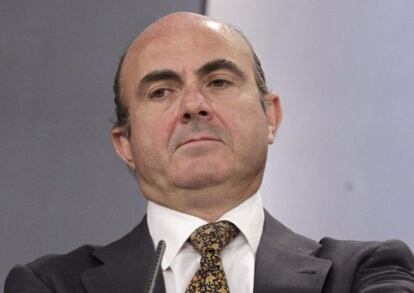Minister blames spike in Spain’s risk premium on Greece’s political problems
ECB to help with valuation of bank real estate assets De Guindos rules out need for restrictions on financial outflows

Spanish Economy Minister Luis de Guindos on Tuesday blamed the recent run-up in Spain’s risk premium primarily on Greece, and placed the responsibility for resolving this problem in the court of the European Union.
While acknowledging that the risk premium of Spain and Italy is “not sustainable,” De Guindos told a news conference after a meeting of European Union finance ministers that the instability in the markets “has more to do with the political crisis than with the economic and financial” crisis. The minister pointed to the “significant effort in [fiscal consolidation] and reforms” carried out by the Spanish government.
Greece seems set for another general election on June 17 after its main parties failed to reach an agreement on forming a government after the poll earlier this month. This development is expected to keep the pressure on Spain’s sovereign debt in the markets. The spread between the yield on the benchmark 10-year government bond and the German equivalent on Tuesday rose 11 basis points to 488 basis points.
“Greece has a contract: in exchange for assistance it has to put in place certain economic policies, but without a government that is not possible,” De Guindos said. “We have to think about the future steps that have to be made in Greece. We have to analyze what has been done in the case of Greece for the implications this crisis has for the rest of the Union. Greece doesn’t want to leave the euro. On this there has to be coordination; governments have to do their homework but the EU also has to do its homework.”
Governments have to do their homework but the EU also has to do its homework”
Earlier on Tuesday, De Guindos said Spain had asked the European Central Bank for assistance in setting valuations to the real estate assets Spanish banks are being required to remove from their balance sheets in order to speed the process up.
The government has said it will appoint two independent appraisers to carry out the valuations. “There are doubts about the Spanish banking system,” De Guindos said. “The government maintains that the perception of the reality the markets have is worse than the reality. That is why we have undertaken this exercise in transparency.”
The minister said the government wants to complete the valuation process in two months rather than the three to four months he calculated it would take last week. “They [the Eurogroup] asked us to speed up the work, and of course the Spanish government is absolutely open to this.”
There was some confusion over whether the ECB’s involvement in the valuation process was at Spain’s bidding or an initiative of the ECB itself. “The ECB showed interest in cooperating with the Bank of Spain and the independent appraisers,” De Guindos said as he brushed aside questions on whether this would undermine the prestige of the Bank of Spain.
De Guindos also dismissed suggestions that the Eurogroup had asked Spain to tap the European Financial Stability Facility to speed up the process of cleaning up the banks. “Nobody has asked anything like that,” De Guindos said. “The only thing our partners have asked is for us to speed up the valuations.”
The minister said the idea of a lock-in of bank deposits along the lines of the notorious “corralito” imposed by the Argentinean government in 2001 before the devaluation of the peso “seems to me to be a leap into the unknown that makes no sense at all.”
There have been significant outflows of investment funds this year due to a lack of confidence in Spain and fears the euro zone could break up. According to figures released earlier this month by the Bank of Spain, a net 128.655 billion euros of financial investments has been pulled from Spain since July of last year. In February alone the figure was 25.548 billion euros.
Tu suscripción se está usando en otro dispositivo
¿Quieres añadir otro usuario a tu suscripción?
Si continúas leyendo en este dispositivo, no se podrá leer en el otro.
FlechaTu suscripción se está usando en otro dispositivo y solo puedes acceder a EL PAÍS desde un dispositivo a la vez.
Si quieres compartir tu cuenta, cambia tu suscripción a la modalidad Premium, así podrás añadir otro usuario. Cada uno accederá con su propia cuenta de email, lo que os permitirá personalizar vuestra experiencia en EL PAÍS.
¿Tienes una suscripción de empresa? Accede aquí para contratar más cuentas.
En el caso de no saber quién está usando tu cuenta, te recomendamos cambiar tu contraseña aquí.
Si decides continuar compartiendo tu cuenta, este mensaje se mostrará en tu dispositivo y en el de la otra persona que está usando tu cuenta de forma indefinida, afectando a tu experiencia de lectura. Puedes consultar aquí los términos y condiciones de la suscripción digital.









































